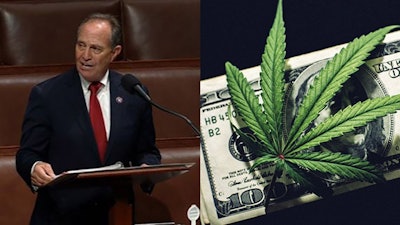
As Senate leadership from both sides of the aisle has continued to hold cannabis banking reform hostage since September 2019, one of the loudest reform voices in Washington sent a letter urging those in the driver’s seat to act.
Rep. Ed Perlmutter, D-Colo., who first authored and introduced the Secure and Fair Enforcement (SAFE) Banking Act in July 2013 with former congressman Denny Heck, D-Wash., addressed the letter to Senate Majority Leader Chuck Schumer, D-N.Y., Senate Banking Committee Chairman Sherrod Brown, D-Ohio, Senate Finance Committee Chairman Ron Wyden, D-Ore., and Sen. Cory Booker, D-N.J.
“The SAFE Banking Act is an immediate solution to get cash off our streets and ensure state-legal, legitimate businesses can operate like any other type of business, particularly small and minority-owned cannabis businesses who have been disproportionately impacted by the lack of banking services,” Perlmutter wrote.
The letter, sent April 19, comes after the U.S. House has passed SAFE Banking six times, including twice as a standalone bill via a 321-103 vote on Sept. 25, 2019, and by a 321-101 vote on April 19, 2021. Most recently, SAFE Banking passed the House as an amendment to the America COMPETES (Creating Opportunities to Meaningfully Promote Excellence in Technology) Act on Feb. 3, 2022.
RELATED: Rep. Perlmutter Makes Final Push on SAFE Banking
Despite bipartisan support for the legislation, SAFE Banking has never seen the light of day in the Senate because former Majority Leader Mitch McConnell, R-Ky., never acted on calendaring it for floor debate in the upper chamber the first three times the House passed it. Now, Schumer and his Democratic colleagues have handcuffed advancing the reform effort in the latter three House passages.
That inaction on the bill is despite 42 Senate co-sponsors, including nine Republicans.
“The SAFE Banking Act presents our greatest opportunity to ensure some level of federal cannabis reform gets done this year,” Perlmutter wrote. “It is an important step in creating a safer and more equitable industry, and a first step in breaking the logjam on cannabis reform to pave the way for broader, more comprehensive reforms in the near future.”
While Perlmutter acknowledged that he and the Senate quartet he penned all agree on the need to pass comprehensive legislation to reform “our outdated, dangerous, and inequitable federal cannabis laws,” no reforms have been made to federal laws since cannabis was first listed as a Schedule I drug as part of the Controlled Substances Act passed in 1970.
“The work to update federal cannabis laws and right the wrongs of the war on drugs is necessary and long overdue,” Perlmutter wrote. He added, “Over the past decade, we’ve seen voters and legislatures in 47 states, four territories and the District of Columbia pass some form of recreational or medical cannabis laws, including hemp and CBD products.”
While Schumer, Wyden and Booker have been busy trying to introduce a broader federal legalization measure, the Cannabis Administration and Opportunity Act (CAOA), that introduction has continued to be kicked down the road since they first issued a joint statement on initiating the legislation in February 2021.
That Senate trio had intended to formally introduce the act this month, but Schumer issued a statement April 14 that he, Wyden and Booker won’t meet that timeline and will instead aim to file the legislation at some point before the August 2022 recess.
In the meantime, the Senate trio has not shown much motivation to bring incremental reform, like SAFE Banking, to the table. In fact, when they introduced a draft version of CAOA in July 2021, Booker was adamant that SAFE Banking as a standalone measure was the wrong approach to reform.
Booker said during a July 2021 press conference that he would fight to keep SAFE Banking from advancing through the Senate if it’s not part of a larger reform effort that’s paired with addressing criminal convictions, restorative justice and equitable business opportunities.
If somebody tries to push through just the banking bill, Booker said, “I don’t know about other members of the Senate, but I will lay myself down to do everything I can to stop an easy banking bill that’s going to allow all these corporations to make a lot more money off of this, as opposed to focusing on the restorative justice aspect.”
Many of the larger cannabis businesses already have access to banks, while smaller operations are often unable to find depository institutions willing to take them on, leaving them to deal primarily in cash—making them susceptible targets of crime, robbery and assault.
Booker’s CAOA colleagues didn’t express opposition to his remarks.
“The banking bill deals with a small part of this, but not what needs to be done,” Schumer said in the July press conference. “We need a broad, comprehensive bill.”
While Perlmutter wrote in his April 19 letter that legalizing and decriminalizing cannabis is the “most expedient way” to deal with myriad issues which have developed due to the misalignment in state and federal cannabis laws, he added lawmakers mustn’t neglect incremental reform that can be made now in hopes of passing broad reform later.
“As the end of the 117th Congress is quickly approaching, we cannot let the political realities of passing comprehensive cannabis reform through the Senate prevent progress for our communities now,” Perlmutter wrote.
Perlmutter specifically referenced three fatal shootings in connection to dispensary robberies that happened during the course of a week last month in western Washington state.
From banking and tax issues to addressing the drug war, Perlmutter wrote that Congress has a responsibility to address outdated laws and better align them with cannabis laws currently in place in the majority of states across the country.
He called the SAFE Banking Act an “icebreaker” for further reform.
“We share the same goals to fully reform federal cannabis laws,” Perlmutter wrote. “We cannot let our fight for comprehensive cannabis reform stall progress this year. This would be to the detriment of thousands of state-legal businesses, their employees, and the safety of our communities.”


























